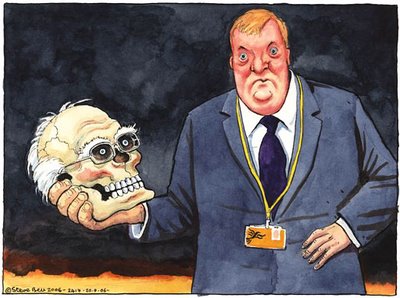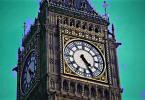 copyright: The Guardian
copyright: The GuardianCharles Kennedy's much anticipated return to the public stage took place at the Liberal Democrat conference yesterday.
The former leader gave an assured and confident speech, speaking for the most without notes and wandering the platform in the manner of an inspirational speaker.
And, boy, was he inspirational. The party faithful were delighted by this star turn from Kennedy, looking relaxed, healthy and sober, and he was treated to two standing ovations from the packed conference hall.
The content of Kennedy's speech was a wide-ranging lament for the government's misguided foreign policy, and a call for more international co-operation.
He started by admitting that the past 12 months had been the 'best of times and worst of times' for the Lib Dems.
Quashing rumours he might be standing down, Kennedy told the delegates he had refused many offers of TV appearances so that his conference address would be his first public engagement since he was forced to resign in January.
"Politics is where I want to be and it's our politics I want to stay in," he told the conference. His message to the party was positive. He predicted they would see historic victories in next year's elections for the Scottish parliament, and reiterated the message that only the Liberal Democrats have a truly radical agenda:
"We are a force for change in British politics, but we can change the circumstances and the context for the better around about us without, in any sense whatsoever, surrendering that we are Liberal Democrats, we are staying Liberal Democrats and my God we are proud to be Liberal Democrats."
Mr Kennedy went on to mock the last 10 years of Blair, claiming the government have been consistently timid in their approach. Instead of seizing the opportunity afforded by massive public support and huge Commons majorities to deliver root and branch reform, the Labour party had wasted their opportunity and are now a spend force.
The former leader's most passionate words were about the current war, and the damage the government have done to the UK's image internationally: "I am saddened by the legacy of Iraq, and it gives me no pleasure that our position has been vindicated. The tragedy of Iraq is that the standing and integrity of our country has been damaged."
Mr Kennedy also warned against the "crude, cheap, self-defeating slide into anti-Americanism," saying one of the happiest times of his life was studying in the US in the early 1980's, a time when Margaret Thatcher was riding high. He urged his audience to see that only four in ten Americans support Bush and the neo-cons, in exactly the same way that only four in ten British voters supported Thatcher.
He also spoke passionately about the need for immediate action on climate change.
Former leader Paddy Ashdown told the BBC that he thought it was a farewell speech - no-one else did.
Current leader Ming Campbell reiterated his comments that Kennedy would be welcome back on the front bench at any time. Others went further.
Baroness Shirley Williams told the BBC:
"I thought it was a speech saying I am dedicated to the cause. I am not coming back right away but I still want to be involved."
"I just thought what an extraordinarily gifted man and what a great pity it was that he fell prey to this illness, alcoholism."
Williams said it was "unlikely but not impossible" that Kennedy could one day return as leader.
